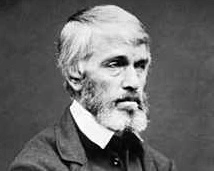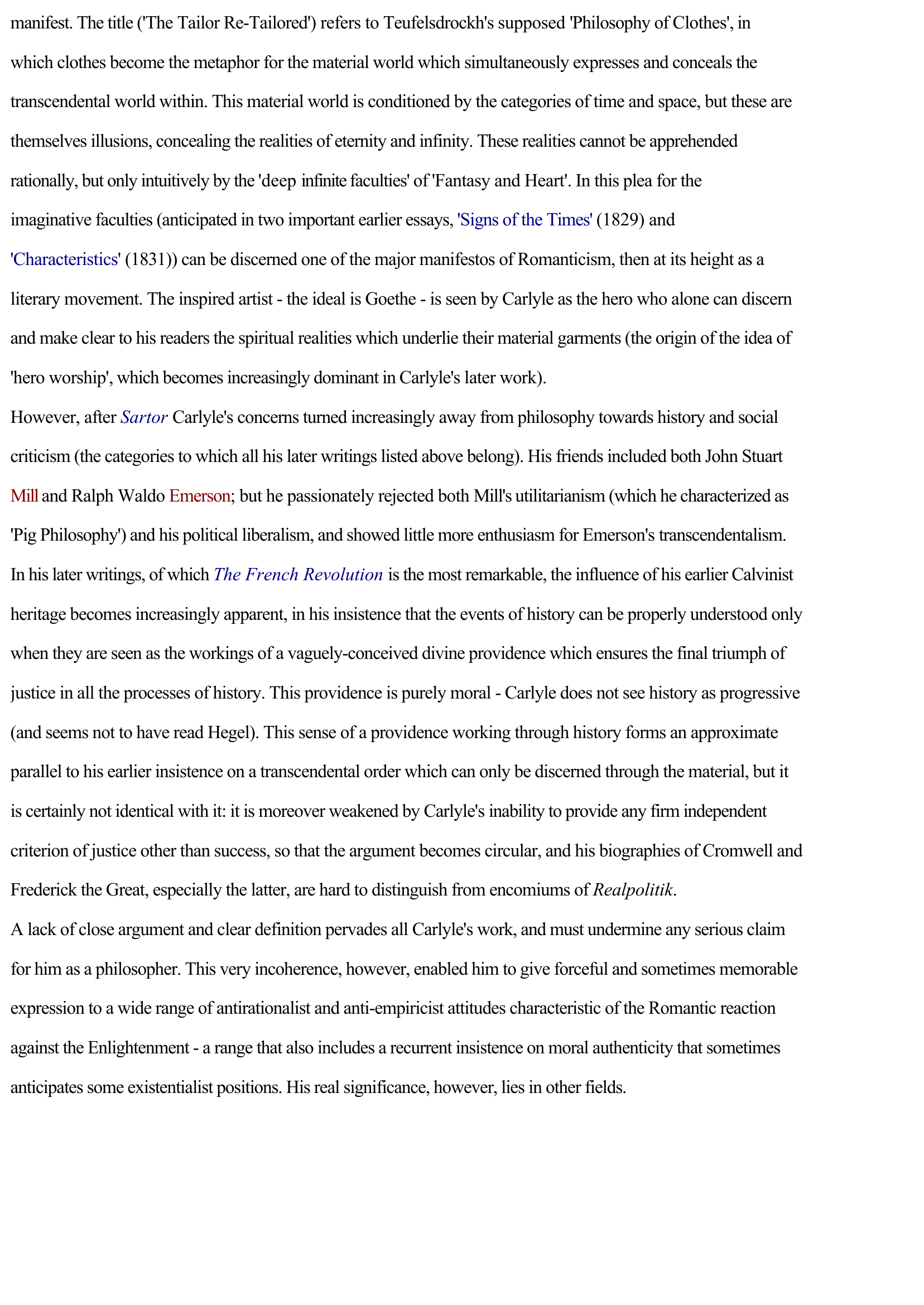Carlyle, Thomas
Publié le 25/02/2010

Extrait du document

Although widely influential as a historian, moralist and social critic, Carlyle has no real claim to be considered a philosopher. He does have some importance as one of the transmitters of the ideas of the German Idealists, such as Kant and Fichte, to Britain, and as one of the chief British spokesmen for the Romantic exaltation of the imagination above the understanding; but his grasp of philosophical issues is vague. His later writings are dominated by the idea, derived from his childhood Calvinism, of a divine justice working in history through the medium of great men ('heroes') who are its conscious or unconscious instruments. Carlyle was born in Ecclefechan, Scotland, the eldest son of James Carlyle, a farmer and stonemason, and his wife Margaret. Educated at Annan Academy and Edinburgh University, he eked out a meagre living by private tutoring and journalism until leaving Scotland and moving to London in 1834. His first major work, Sartor Resartus, was published in 1833: the most significant of his later writings were The French Revolution (1837), Past and Present (1843), Letters and Speeches of Oliver Cromwell (1845) and The History of Frederick the Great (1858-65). Carlyle is important as a literary figure, a moralist, a historian and a social critic, but has little serious claim to be considered a philosopher, though he was sometimes regarded as such by his contemporaries. His chief interest in this regard is as one of the transmitters of German Idealism to Britain in the 1820s. The tradition of Scottish Calvinism in which he had been brought up had been shaken by his encounter with the ideas of the Enlightenment at Edinburgh University, and he found in the German Idealist tradition a resolution of the problems this caused him. His enthusiasm for this tradition was expressed in a series of review articles from the 1820s which first brought his name before the public - notably on the 'State of German Literature' (1827) and 'Novalis' (1829) (see also 'Voltaire' (1829) and 'Diderot' (1833) for his repudiation of the rationalism of the Enlightenment).

«
manifest.
The title ( 'The Tailor Re- Tailored' ) refers to Teufelsdrockh's supposed 'Philosophy of Clothes' , in
which clothes become the metaphor for the material world which simultaneously expresses and conceals the
transcendental world within.
This material world is conditioned by the categories of time and space, but these are
themselves illusions, concealing the realities of eternity and infinity.
These realities cannot be apprehended
rationally, but only intuitively by the 'deep infinite faculties' of 'Fantasy and Heart' .
In this plea for the
imaginative faculties (anticipated in two important earlier essays, 'Signs of the Times' (1829) and
'Characteristics' (1831)) can be discerned one of the major manifestos of Romanticism, then at its height as a
literary movement.
The inspired artist - the ideal is Goethe - is seen by Carlyle as the hero who alone can discern
and make clear to his readers the spiritual realities which underlie their material garments (the origin of the idea of
'hero worship' , which becomes increasingly dominant in Carlyle's later work).
However, after Sartor Carlyle's concerns turned increasingly away from philosophy towards history and social
criticism (the categories to which all his later writings listed above belong).
His friends included both John Stuart
Mill and Ralph Waldo Emerson ; but he passionately rejected both Mill's utilitarianism (which he characterized as
'Pig Philosophy' ) and his political liberalism, and showed little more enthusiasm for Emerson's transcendentalism.
In his later writings, of which The French Revolution is the most remarkable, the influence of his earlier Calvinist
heritage becomes increasingly apparent, in his insistence that the events of history can be properly understood only
when they are seen as the workings of a vaguely-conceived divine providence which ensures the final triumph of
justice in all the processes of history.
This providence is purely moral - Carlyle does not see history as progressive
(and seems not to have read Hegel).
This sense of a providence working through history forms an approximate
parallel to his earlier insistence on a transcendental order which can only be discerned through the material, but it
is certainly not identical with it: it is moreover weakened by Carlyle's inability to provide any firm independent
criterion of justice other than success, so that the argument becomes circular, and his biographies of Cromwell and
Frederick the Great, especially the latter, are hard to distinguish from encomiums of Realpolitik .
A lack of close argument and clear definition pervades all Carlyle's work, and must undermine any serious claim
for him as a philosopher.
This very incoherence, however, enabled him to give forceful and sometimes memorable
expression to a wide range of antirationalist and anti-empiricist attitudes characteristic of the Romantic reaction
against the Enlightenment - a range that also includes a recurrent insistence on moral authenticity that sometimes
anticipates some existentialist positions.
His real significance, however, lies in other fields..
»
↓↓↓ APERÇU DU DOCUMENT ↓↓↓
Liens utiles
- HISTOIRE DE FRÉDÉRIC LE GRAND (résumé) de Thomas Carlyle
- HÉROS (Les) Thomas Carlyle (résumé)
- Carlyle, Thomas - écrivain.
- Carlyle Thomas, 1795-1881, n? ? Ecclefechan, ?crivain ?cossais.
- Carlyle Thomas, Ecclefechan, Dumfriesshire 1795 - Londres 1881 (Biographie)

































